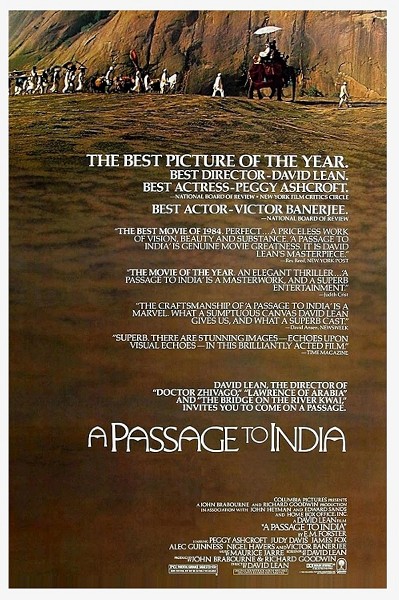
The screening will be introduced by guest curator Anupma Shanker.
David Lean's 1984 epic historical drama, A Passage to India, marks the final film of his glorious career which is decked with critically-acclaimed masterpieces like The Bridge on the River Kwai (1957), Lawrence of Arabia (1962), Doctor Zhivago (1965) and Brief Encounter (1945).
Written, directed and edited by Lean, and winner of two academy awards, A Passage to India is based on the 1960 play of the same name by the Indian-born American writer Santha Rama Rau, which is in turn adapted from E. M. Forster's highly acclaimed 1924 novel.
Set in the 1920's in the fictional city of Chandrapore during the British Raj amidst growing Indian independence movement, the narrative unfolds in a series of intriguing twists and turns following close encounters between various British and Indian characters. When Adela Quested, the proper young Englishwoman who is unofficially engaged to the city magistrate Ronny Heaslop, accuses the Indian doctor Aziz Ahmed of attempted rape during a daytrip in the Marabar Caves, the incident spreads like wildfire, escalating tensions between the natives and the ruling British elites. As sparks fly, cultural mistrust deepens, colonial power structures are threatened and relationships are put on trial, it seems that in the end, the truth shall set everyone free...but does it?
Shot by Lean's collaborator Ernest Day (who often referred to Lean as his 'eyes'), the film's evocative cinematography and authentic outdoor locations set the perfect mood and aesthetic tone for its multi-layered themes of imperialism, racial prejudice, religion and cross-cultural imbroglios whilst never losing sight of the 'mysterious' and the 'exotic' as observed and absorbed through the 'English eyes' of the film’s key characters, Adela and Mrs. Moore, who upon arrival are intrigued by the desire to explore 'the real India' but soon find themselves catapulted away from the predictable tedium of their colonial lives into the 'unexplainable muddle' that is India. (A term used by Forster in a 1934 letter).
40 years since its release, A Passage to India remains a wonderfully provocative tale, full of striking images, haunting moments and unforgettable characters, all played to near perfection.
Anupma is a British-Indian film curator and archives researcher, with a deep and evolving interest in colonial & post-colonial screen narratives. Her curatorial practice is focussed on researching, screening and creating conversations around heritage films, with aim of making them accessible to a wider audience, both within and outside the UK. Her other interests include, Black-British cinema, Post-war Japanese Cinema, Indian Parallel Cinema, and Iranian New-wave Cinema.